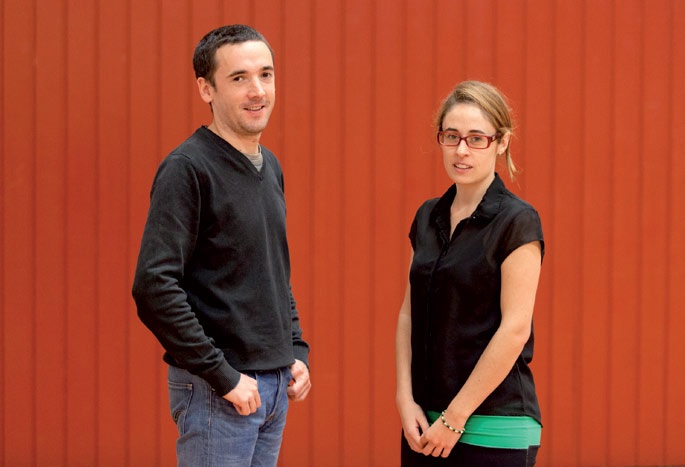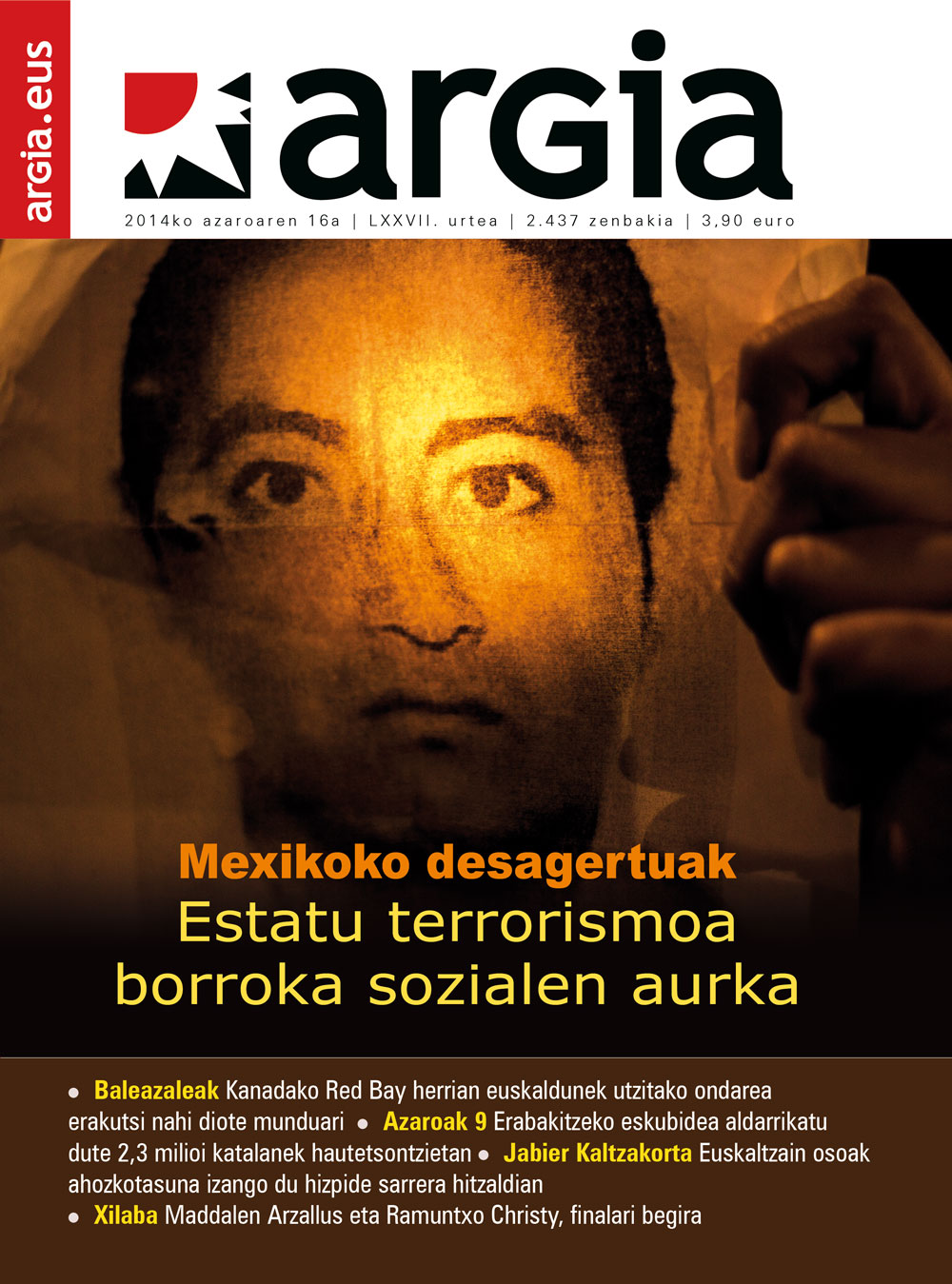"The function of Xilaba is to take the Basque to the plaza, more than to sing bertsos"
- IV. The final of the Bertsulari Xapelketa (Xilaba) of Zuberoa, Lapurdi and Baja Navarra will be played on 15 November in Baiona. Eneritz Zabaleta, Subai hill, Odei Barroso, Xumai Murua, Maddalen Arzallus and Ramuntxo Christy. We've talked to Christy, who comes to the end for the first time, and Arzallus, who comes to the end for the second time.

How did you feel in Xilaba?
Maddalen Arzallus: With the first program I was very comfortable, without taking into account the quality of the bertsos, I simply sang to taste. With the second session, half-hearted… in the little zortziko we drove a bit into the hole and that really obscures me all the rest of the program. But thinking about the cold, knowing that it wasn't the best program of my life, it was a session that I was quite happy about.
Ramuntxo Christy: In the two sessions I felt very different. In the Aiherra program, I did a very serious exercise, following the format given by the chapelket, and a very serious session came out of my mouth. I usually play from humor, and I went out with that grief, even though I had done a good session. Although the level of improvisation is a little lower, I am glad I managed to put more emphasis on humor and bring my spirit into the program.
Have the amateurs responded well?
M. Arzallus: I believe that in this year’s Xapelka more people have met in semi-finals and semi-finals than in previous years, it seems to me that the ball is growing. We will see how much we meet at the end.
Oh my God! Christy: In the programmes in which I have participated, people have responded well. Large groups of people have been gathered in all programmes since the first elimination of the group phase.
What role does Xilaba play in Iparralde?
M. Arzallus: For the Euskaldunes of Ipar Euskal Herria it is not always easy to be Euskaldun and speak in Basque. I also recognise that when I am in Hendaia when it comes to buying bread or speaking in public, I have to do so in French. Xilaba has brought a small movement that, at least every two years, facilitates the encounter between Euskaldunes. It is another opportunity to feel that joy that Herri Urrats or Navarra Day can give us, a time when we can feel Basques without any hindrance.
Oh my God! Christy: The function of Xilaba is to give a place to the Basque in the plaza. In schools, in the ikastolas -- everyone is in favour of the Basque country, but if we move away from education or Basque associations, our language is being heard further and further. Bertsolarism has the first condition in Euskera, and through Xilaba it goes to the plaza. It also aims for people to adapt to the bertsos, but first of all for people to enjoy listening to Basque.
In the years when there is no splash, is there an increase in the number of performances or in the hobby?
M. Arzallus: Iparralde is not Gipuzkoa or Bizkaia, but gradually the young people became fond of the Bertsos. Especially in them, I feel this new hobby. The Basque offer in Iparralde is usually very small, and since the Bertso has the condition of being indispensable, to a large extent people have started to follow the Bertso.
Oh my God! Christy: In recent years, thanks to Xapelketa they have begun to increase the sessions a little. There are fixed sessions in the town festivities organized by associations or ikastolas that are held year after year. But it is true that when we pass through Xilaba there are more performances, as the bertsolaris have returned to the plaza. There you see that the bertso gains more weight. Although it is not valid in the long term, it is gradually moving.
How have you received the fondness for bertsolarism?
M. Arzallus: I don't even remember how it started. My father has been singing bertsos to us from a very young age. I remember we were going to hear recitals from bertsos, like those from my father's Navarra Championship, or when we stayed at home we would hear them on the radio. We sang a lot the bertsos of Txirrita, Xalbador and Xenpelar in the car (a Basque Frenchman, those of the whale of Orio…). Then I started in Hendaia's bertso eskola when I was nine years old, and there I followed. Four or five years ago I separated a little from Bertsolarism, but I decided to come back.
Oh my God! Christy: I started later than the bertsolaris of my generation, about ten years ago. But the truth is, before we started at Maule's bertsolaris school, we played singing bertsos or mimicking the bertsolaris. There is tradition in Aiherra, and we have the opportunity to listen bertsos all year round. I started to give the themes in the sessions of the people, and slowly I've gone deeper.
What has pushed you to sing bertsos again, Maddalen?
M. Arzallus: I would say, to begin with, the times. I left the time because I needed, and I lost a little taste for bertso. On the other hand, the Bertsolaris Championship of Euskal Herria also gave me that worm. I was often in the audience as a listener, and when I heard the issues, I felt that I had a lot of ideas coming, that I always had something to say.
In your day to day, what place does the bertso occupy?
M. Arzallus: He has never lost his place. I am not one of those engaged in the Bertsos, but I am aware of what is happening in Bertsolarism, and I read old Bertsos. I'm also going from time to time to bertsos school -- and then, of course, there's a subject that comes out a lot of times in our house.
Oh my God! Christy: It used to be a larger place. When I started singing bertsos, Joanes Etxebarria, Xan Alkhat -- we got full into that world. We went to bertsos school every week, and we also did a radio show in Euskal Irratiak, entitled Punttuka. At that time, I listened to the verses every day, for example, radio. Now life has led us to other things.
When, how, with whom… do you train?
M. Arzallus: At the Bertsos school in Senpere we met many of those who participated in Xapelketa: Odei Barroso, Xumai Murua… In addition, there is also training that everyone does at home. You never know if it's OK or not. The truth is that sometimes it's hard to know what to do to train at bertsos.
Oh my God! Christy: I've been training in Maule's Bertsos School for eight years. We acted Joanes Etxebarria, Xan Alkhat, Mixel Etxekopar, Pette Etxebarria and the five. Throughout the year we have managed to keep the team in a good atmosphere. We're all looking for something on the bertso and getting along. In the Xapelka we do not stay more often than on other occasions, I will be the father and Xan will also have his second daughter this winter… I think that has also pushed us a little further.
What do you need to sing bertsos?
M. Arzallus: Having your head focused that day, being there. On the other hand, the public also changes the situation a lot. Faced with a cold or easily lit audience, there is a difference. Then there are many factors, but especially the public affects me a lot.
Oh my God! Christy: I need peace of mind, but the public also gives me warmth. It doesn't matter if you're four from bertsolaris school. I want to offer something to the public and feel satisfied gives me strength.
What do you like about bertsolarism?
M. Arzallus: The truth is that I have rarely listened to Ramuntxo, for so far I have had more as a subject carrier. But this year I've heard it in my program, and maybe I've followed his program more closely than everybody else's. It has new ideas, freshness. Many times, those of us who since we're young at the eskola bertso have some models that we didn't want, and it's hard to get out of them. I saw him come up with much cooler ideas, maybe because he's newer, and he sounds a lot of humor.
Oh my God! Christy: Maddalen always pulls out ideas that aren't expected, and that's what I love the most. Not in all performances, but at any given time you will always get an idea you haven't seen before. That is what gives it singularity.
Do you have any habit or mania before you go onstage?
M. Arzallus: Lately, I touch the dog before I leave the house. Recently Amets met a guy with schizophrenia, and I've also heard a lot about him. He had gotten into his head that if I played a dog, it would give him good luck. And I, too, just in case, play before going to the program. Who knows ...
Oh my God! Christy: Like everyone else, before the session I go to the bathroom.
What are you going to do at the end?
M. Arzallus: To be content with myself. I've gone to that since the championship started, the post doesn't matter much to me. If I've presented myself, it's been to feel good on stage, and to sing quietly. If I can then provide something, better. I'm going to sing without suffering.
Oh my God! Christy: As always, I'm going to give something to the public.























